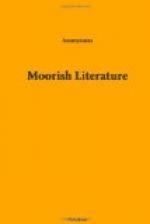Now Aly Et-Try is their manager;
He runs about all day, with naught achieved.
The Christian kept them in a stable shut,
And like a squad of soldiers took them
out.
He herded them like oxen there, and naught
Was lacking but the drover’s lusty
cries.
Consider now the plight of Ould Sayyd,
The big-jawed one. He gained ten
thousand francs,
And lost them all at gambling. Naught
remains
Except the benches and some coffee-grounds.
The leader of musicians, wholly daft,
Whose beard is whiter than the whitest
wool,
Has gone to Paris gay to see the sights.
(I hope he’ll bring up in the fires
of hell!)
If he comes back deceived, at least he’ll
say
He’s been abroad, and dazzle all
his friends.
The oboe-player, Sydy Ali, was
Barber and cafekeeper, eager for
A change, and crazy to get gold.
“This trip,”
He told his friends, “is but a pilgrimage.”
There’s nothing lacking but the
telbyya.
“I’ve taken trips before and
with good luck.
I was the master, with my art acclaimed.
I was director of the Nouba, at
The court, when Turkey held the reins
of power.
I was a court buffoon and broke my heart.
O Lord, why send’st thou not thy
servant death?
“I left a workman in my shop so
that
I might not lose my trade. I went
to show
My oboe, for someone might ask for it.
I used to travel with musicians once.”
God bless him!—what a workman. He conversed
With all the customers who passed that way.
He took them in the shop and told his case—
“I’m here for a short while.” Then he began
To praise his patron, who, he said, would have
A gift for him.
And
his lieutenant, named
Oulyd-el-Hadj Oualy, is a fool
Who thinks his word superior to all,
And that there’s no one like him
in this world.
When he has gone there and come back again,
He will be perfect. All he contradicts
Who speak to him, and will not let them
lift
A finger. Little love he hath for
those
Who speak with candor, but he’s
very fond
Of liars, and always bids them come to
him.
“My childhood was so pampered!”
he remarks,
And flies into a passion if one doubts.
He only lives on semolina coarse,
And empty is his paunch, all slack and
limp.
Yet every day he tells you how he’s
dined.
“I have discovered,” he is
wont to say
“A certain semolina lately brought
By a Maltese, who lives some distance
off.
You never saw the like. I’m
going to have
Some fine cakes made of it, and some meqrout.”
And El-Hadj Mostefa was dragged along
By all these lies and by the love of gain.
If God had not abandoned him, he’d
be
Still making lasts. But ’twas
the crowd that led
Him on, and that is how it came to pass.




